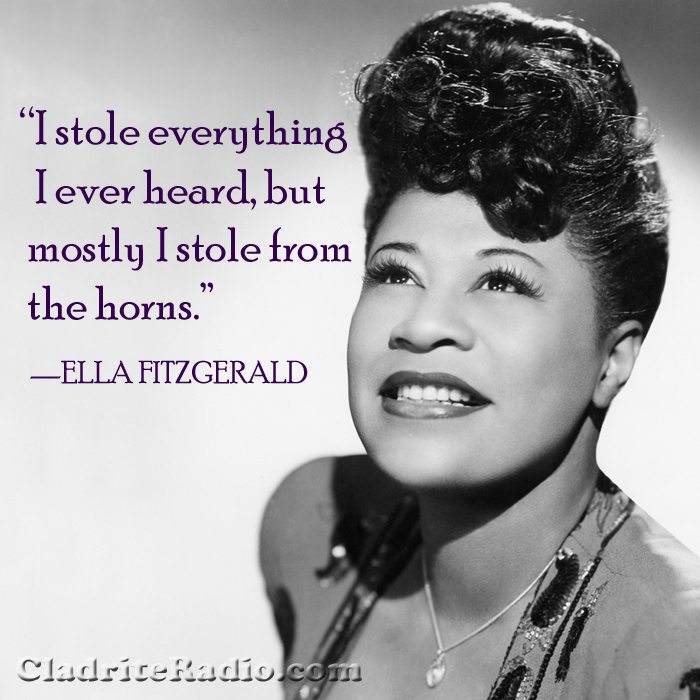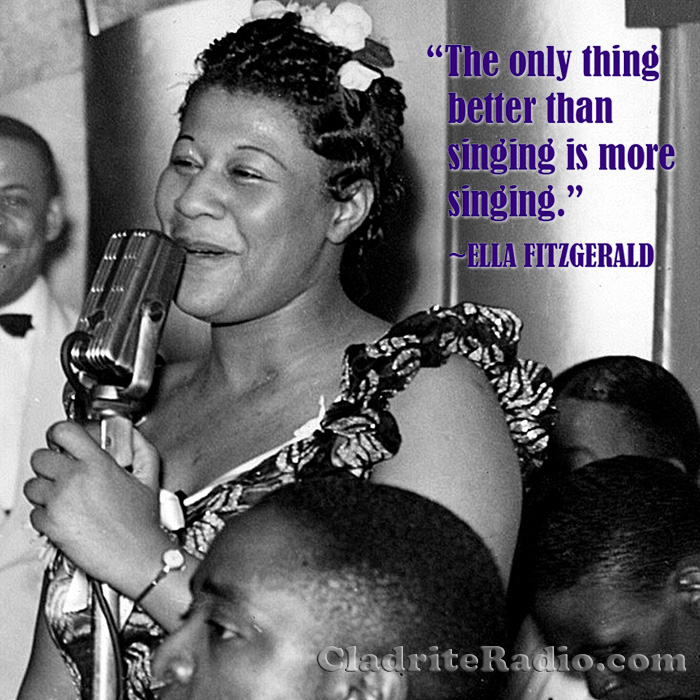The incomparable Ella Fitzgerald was born 105 years ago today in Newport News, Virginia; We’re celebrating the occasion by featuring her music all day long, so tune in now!


The incomparable Ella Fitzgerald was born 105 years ago today in Newport News, Virginia; We’re celebrating the occasion by featuring her music all day long, so tune in now!

The incomparable Ella Fitzgerald was born 100 years ago today in Newport News, Virginia. Here are 10 EF Did-You-Knows:
Happy birthday, Ms. Fitzgerald, wherever you may be!

 Sometimes, no matter how silly an idea is, you just have to go for it. Sell it like you mean it, brother, and there’s no telling how far your idea might go.
Sometimes, no matter how silly an idea is, you just have to go for it. Sell it like you mean it, brother, and there’s no telling how far your idea might go.
We were recently musing on how committing to a concept can pay off as we listened to a song we’re fond of, though we can’t deny it’s sheer fluff.
“‘Way Back Home” was written in 1935—the corny but infectious lyrics are by Al Lewis (not the actor who played Grandpa on The Munsters, but he did write the lyrics for “Blueberry Hill”) and music by Tom Waring, Fred‘s brother—and though it uses the same lyrical idea over and over and over, it is one catchy ditty.
You may not think so at first listen, but believe us, the gimmick grows on you.
To prove it, we’re offering five versions of the song. Listen to them all, and believe us, you’ll be hooked but good.
We start you off with a recording by Irving Aaronson and His Commanders, featuring Skippy Carlstrom on vocals. This one’s nice and bouncy and relatively straightforward.
Next up are the Boswell Sisters, and they were never straightforward, but they did include the intro verses in their version of the song.
Ambrose and His Orchestra, with Jack Cooper on vocals, recorded the third among the renditions we’re sharing with you, followed by the Decca All-Star Revue, which is a two-sided recording featuring the Victor Young Orchestra, with Bob Crosby, Ella Logan, Johnny ‘Scat’ Davis, Cleo Brown, and the Tune Twisters taking turns on vocals.
The final recording is the Victor Young Orchestra again, this time with Milton Watson on vocals.
Which one’s your favorite?
Irving Aaronson and His Commanders—‘Way Back Home
The Boswell Sisters—‘Way Back Home
Ambrose and His Orchestra—‘Way Back Home
The Decca All-Star Revue—‘Way Back Home
Victor Young and His Orchestra—‘Way Back Home
‘Way Back Home
Intro:
I wrote a little song, a homesick little song,
About a place I never should have roamed from;
Skies are just a little brighter there,
Hearts are just a little lighter there.A wanderer am I, beneath a foreign sky,
A lonely soul among a world of strangers;
From the pages of my memory,
I can hear a voice reminding me.The roads are the dustiest; the winds are the gustiest;
The gates are the rustiest; the pies are the crustiest;
The songs, the lustiest; the friends, the trustiest,
‘Way back home!The trees are the sappiest; the days are the nappiest;
The dogs are the yappiest; the kids are the scrappiest;
The jokes, the snappiest; the folks, the happiest,
‘Way back home!Don’t know why I left the homestead, I really must confess.
I’m just a weary exile, singing my song of loneliness.The grass is the springiest; the bees are the stingiest;
The birds are the wingiest; the bells are the ringiest;
The hearts, the singiest; the arms, the clingiest,
‘Way back home!The sun is the blaziest; the fields are the daisiest;
The cows are the graziest; the help is the laziest;
The boys, the wittiest; the girls, the prettiest;
‘Way back home!The pigs are the snootiest; the owls are the hootiest;
The plants are the fruitest; the stars are the shooiest;
The grins, the funniest; the smiles, the sunniest,
‘Way back home!Don’t know why I left the homestead, I really must confess.
I’m just a weary exile, singing my song of loneliness.The food is the spreadiest; the wine is the headiest;
The pals are the readiest; the gals are the steadiest;
The love, the liveliest; the life, the loveliest,
‘Way back home!